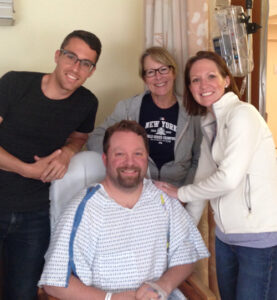
Unlike most surgical procedures, particularly those of an urgent or emergency nature, undergoing a prophylactic (preventive) procedure like a Gastrectomy, affords one a bit of luxury – time to plan and prepare for this major life-changing event. Even if your surgery is not prophylactic in nature, this information can help. About Your Gastrectomy Surgery.
Take advantage of this opportunity to help to make the entire process a bit less stressful. Careful planning before your surgery will allow you to focus your energy following surgery on your recovery.
Develop a Support Network
In preparing yourself for the journey through prophylactic gastrectomy, be sure to ask friends and loved ones for things you may need help with, and for emotional support. Friends often want to help you but don’t quite know how; make small suggestions that you know would help you upon your return – a ride home from the hospital or airport, picking up your prescriptions from the pharmacy, making a trip to the grocery store, taking you to a follow-up appointment, or just stopping by to visit and see how you’re feeling. Make arrangements for help with young children if necessary. Lifting will be restricted (likely to a maximum of five pounds) for a period of time following your surgery. You may be ready for short daily walks – ask someone to join you for a walk around the block. Your courage and determination to prevent this disease will be inspiring.

Create a Journal/Blog
It’s free, easy, and will provide support and encouragement by keeping you connected to family and friends. This is a great way to keep everyone up to date on your surgery and recovery and eliminates the need to send mass mailings. Anyone you choose can post updates until you are ready to do so yourself. It is also a record of your personal journey, something you may enjoy reading later on.
There are many sites offering these services, two favorites are Blogger and CaringBridge. If you’d like to share your journal with others through our Stomach Cancer Journeys page, you can submit it here. Sharing your journey and stories within a blog can be tremendously therapeutic for others in our community to read.
Study
Read up. There are numerous posts, articles, and links to reference materials on this site to help you learn more. Knowledge is power. We typically fear the unknown, so learn as much as you can. Getting involved with the NSFC community is a great resource for learning.
Talk to others, particularly those who are upbeat and positive. Most who have been through this will take the time to help others when they can. Learn from their experience, but remember, each individual’s experience is exactly that – individual. Contact us and we can connect you with others.
Prepare Mentally
Be in a positive frame of mind going into this. A positive attitude and outlook make a world of difference. Remember, though it may take one to two years, eventually the body seems to adjust to the absence of the stomach. Prophylactic Total Gastrectomy is considered curative for HDGC. The best part about life after surgery…is life! Know that you are choosing LIFE.
Address Insurance Issues
Call your medical insurance provider to do some initial information gathering. Determine what your insurance coverage is for this type of surgery. Be certain they understand this is not elective surgery; rather it is the recommended course of treatment for those with the CDH1 gene mutation. Ensure they grasp that this is NOT gastric bypass surgery for weight loss.
Ask whether choosing a surgeon outside of your local area or “network” is an option. Sometimes coverage is different for “in-network” vs. “out-of-network” services. A case can be made for coverage of services performed “out of network” at the “in-network” benefit rate if there are no providers with the experience required in the network.
Keep notes, including the name and direct telephone number of everyone you speak with at the insurance company. Once you’ve chosen a surgeon and set a surgery date, you will need to contact your insurance company for pre-authorization.
Find a Primary Care Provider
If you don’t already have a primary care provider in place, get one! Set up an appointment to establish a relationship with the physician before surgery. Take it one step further and schedule an appointment for 4 to 5 weeks post-op for a lesson in administering your monthly vitamin B-12 shot. If another family member will have the honor of poking you, schedule your appointment at a time that is convenient for both of you.
Choose a Surgeon
Determine who will perform your surgery. It is important to find an experienced surgeon, as studies have shown that experience and a good outcome are directly related. Read Choosing a Gastrectomy Surgeon to help you through this process.
Some surgeons require that you have a bowel preparation on the day prior to surgery to empty out the entire length of your intestines and will prescribe a liquid laxative mixture. Be sure you have a prescription ready or filled, and a refrigerator or cooler to keep the liquid cold as it is typically mixed the day before use and must remain cold to make drinking more tolerable.
Arrange your Accommodations
If you have decided to travel to a location far from home for your surgery, make arrangements for accommodations, in advance, for family members who will be traveling to be with you during your hospital stay. Don’t forget accommodations for yourself too, as you will likely need to arrive a day or two in advance of your surgery for pre-operative testing and procedures. You may also need to stay for a short period of time after your release from the hospital before you are able to travel home. Check with your hospital for information about accommodations affiliated with the hospital. Many times they have options offered at reduced rates or at no charge for those who need such assistance.
Gather your Baseline Data
There are many adjustments and changes following surgery. Diet, nutrition, and rapid weight loss will be concerns, especially in the beginning. Ask your physician to do a Chemistry Panel, CBC (Complete Blood Count), Ferritin (iron), Vitamin B-12, and Vitamin D levels prior to your surgery. If you haven’t already had one, request a baseline bone density test. It is important to know what is normal for you. This way your physician will be able to identify changes in your levels. Making comparisons to some average range isn’t going to help identify what has changed for you following surgery.
Meet with a Nutritionist
A nutritionist can discuss with you the dietary and nutrition challenges you will face. Learn as much as you can upfront so that you know what to expect and how to prepare for these changes. Read Nutrition After Gastrectomy for helpful dietary information.
Monitor your Weight
Perhaps a weight loss or weight gain is in order to be in the best shape for your surgery. Studies show that the average weight loss following surgery is approximately 20% of the pre-operative weight. Obese people tend to lose more. Talk to your surgeon to determine a good pre-surgery weight for you.